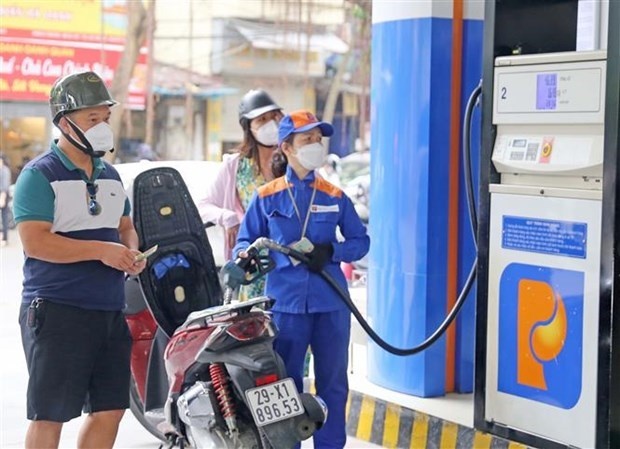Fuel price hike continues to worry leaders
 |
| Illustrative image (Source: VNA) |
On May 23, when the third session of the 15th National Assembly (NA) opened, the Ministry of Industry and Trade and Ministry of Finance increased the price of fuel for the ninth time this year. RON95 was raised to $1.33 per litre, a new record, while E5 RON92 rose to $1.28 per litre. Meanwhile, the price of diesel oil fell slightly to $1.10 per litre.
Following an identical rise two weeks previously, the hikes have worried many NA deputies who have requested the government to find solutions to control the ascension in fuel prices. On average, fuel costs occupy over 40 per cent of production costs in the Vietnamese economy.
“If fuel prices are not well controlled and keep rising as they are now, there will be increases in many commodities and that spiral will lead to an increase in interest rates. At that time, not only people and businesses but also the state would face difficulties in budget revenue,” said NA deputy Tran Hoang Ngan, representing Ho Chi Minh City.
“The past two years have exhausted many sectors in the economy and dented people’s pockets, and now there must be sturdy solutions to control fuel prices,” Ngan added. “For example, environmental protection tax and special consumption tax need to continue being reduced.”
Many countries have pumped money in to stimulate the economy, affected by supply chain disruptions and the Ukraine-Russia conflict, Ngan said. “All these reasons pushed commodity prices into dangerous territory, not only in petrol and gas but now spreading to wheat, rice, and fertiliser.”
Phan Van Mai, NA deputy representing Ho Chi Minh City and also chairman of the municipal People’s Committee, said that one of the existing major concerns of constituents nationwide is the big rise in prices in the market, to a large extent pushed up by expanded fuel prices.
“Higher prices have negatively impacted many people, especially those with low incomes such as factory workers, manual labourers, and students,” Mai said. “Measures must be taken to rein in high prices.”
Nguyen Manh Hung, member of the NA Economic Committee, cited a World Bank report that prices of energy and petrol for 2022 may increase 50 per cent on-year, and food and foodstuffs will also escalate 23 per cent on-year. “This will affect the country’s efforts to control inflation at about 4 per cent this year,” Hung said.
What the stars mean:
★ Poor ★ ★ Promising ★★★ Good ★★★★ Very good ★★★★★ Exceptional
Related Contents
Latest News
More News
- State corporations poised to drive 2026 growth (February 03, 2026 | 13:58)
- Why high-tech talent will define Vietnam’s growth (February 02, 2026 | 10:47)
- FMCG resilience amid varying storms (February 02, 2026 | 10:00)
- Customs reforms strengthen business confidence, support trade growth (February 01, 2026 | 08:20)
- Vietnam and US to launch sixth trade negotiation round (January 30, 2026 | 15:19)
- Digital publishing emerges as key growth driver in Vietnam (January 30, 2026 | 10:59)
- EVN signs key contract for Tri An hydropower expansion (January 30, 2026 | 10:57)
- Vietnam to lead trade growth in ASEAN (January 29, 2026 | 15:08)
- Carlsberg Vietnam delivers Lunar New Year support in central region (January 28, 2026 | 17:19)
- TikTok penalised $35,000 in Vietnam for consumer protection violations (January 28, 2026 | 17:15)

 Tag:
Tag:




















 Mobile Version
Mobile Version